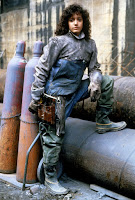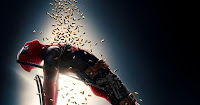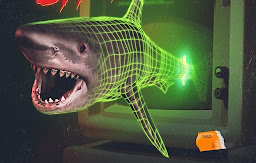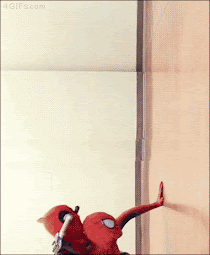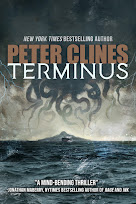Oh, hey everyone. What’s new with you? Anything cool going on?
I’ve had this idea on the backburner for… well, a few years now, but now that I’ve got a handle on it, I’d like to talk to you about one of the most important creative-arts films of the 1980s.
You read the title, so I’m pretty sure you can guess where I’m going with this.
Quick sum up, for those of you who’ve never seen Flashdance. Alex is an eighteen-year-old welder who dreams of being a professional dancer and makes side money as a… what would we call it? Exotic dancer? A non-nude provocative dancer. She’s got a friend who wants to be a professional ice skater and another one who wants to be a comedian. Alex also has a boyfriend who’s twice her age and also her boss at the steel mill, and there’s a lot to unpack there.
Actually, there’s so much to unpack in that relationship it’s what a lot of reviews will focus on. That and, weirdly enough, how unrealistic it is someone could be a professional welder at eighteen in a union town. Probably the same people who complain about how lightsabers work and about how the military sets look in zombie movies.
Getting off topic. Sorry. Anyway…
In my opinion, those issues distract from the actual story, which—if you think about it—is a much more ‘90s story about a trio of young, aspiring performers all looking to break into their chosen fields. We’ve seen a few versions of that, yes? If we look at Flashdance in that light, what’s the story about?
Well, we have our trio of aspiring artistic friends. Alex gets a chance to audition for an exclusive dance conservatory and gets nervous and leaves without auditioning. Her friend enters an ice skating competition and fails (kinda horribly). Her other friend gets a chance to do his comedy routine at an open night mic and bombs (also horribly), but then he decides to move to LA where there are more comedy clubs to try performing at. Meanwhile, Alex’s boyfriend gets her another chance to audition for the conservatory and… she comes up with another excuse to not audition.
Seeing the pattern here? One of these things is not like the other. In this trio of aspiring artists, the other two are failing, but it’s only because they’re actually trying. Alex is the one who won’t take any risks. She’d rather stay in her safe, small pond where she’s a superstar rather than find out she’s not good enough to go higher. That’s her story—working up the courage to try. Because until she does that, nothing else changes. She stays where she is.
This happens to a lot of us in the arts. We get nervous about if we’re good enough and talk ourselves out of doing more. We can’t get rejected—we can’t fail—if we never put ourselves out there, right? Heck, there are even some folks who’ll twist failure into some sort of victory. “Yeah, I got rejected, but that just proves my writing’s too good for the homogenized publishing industry!”
As I’ve mentioned before, though, rejection’s just part of the process. Failure is how we learn and sharpen our craft. And we can’t fail if we never try to do more, to push ourselves higher. So if I’ve never failed… maybe it means I’ve just been playing it safe and not doing enough. Maybe it means, on some level, I stopped.
Y’see, Timmy, we need to push ourselves. We need to keep at it. Even when we get rejected. Even when someone says our chosen genre sucks. Even when they say our writing sucks. Like any art, the only way to improve is to keep doing it. To keep challenging ourselves again and again and again.
Ray Bradbury once said the only way you fail is if you stop writing. Which is the short form of this. So yes, I could’ve called this “the lesson of Bradbury,” but half of you wouldn’t’ve paid attention.
Next time, I’d like to talk about why you rarely see a good writer.
Until then, go write.


